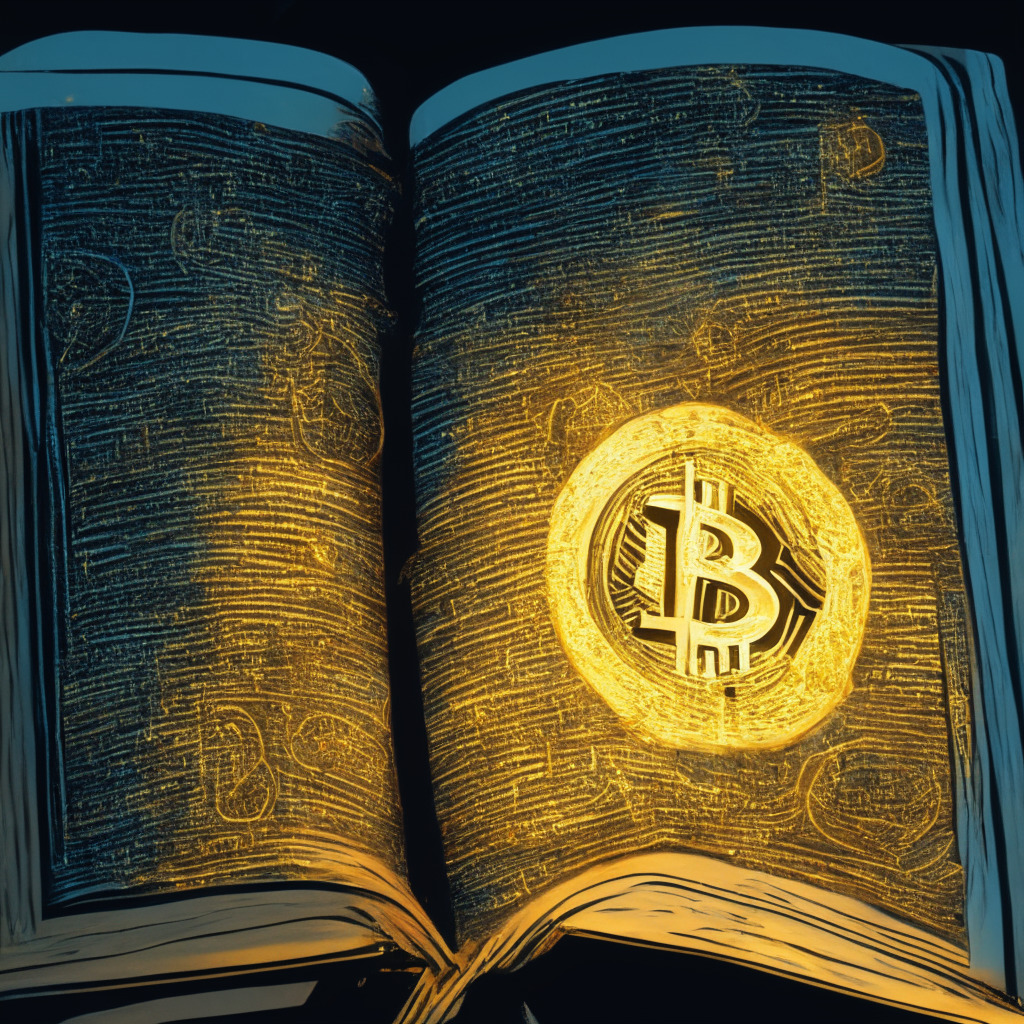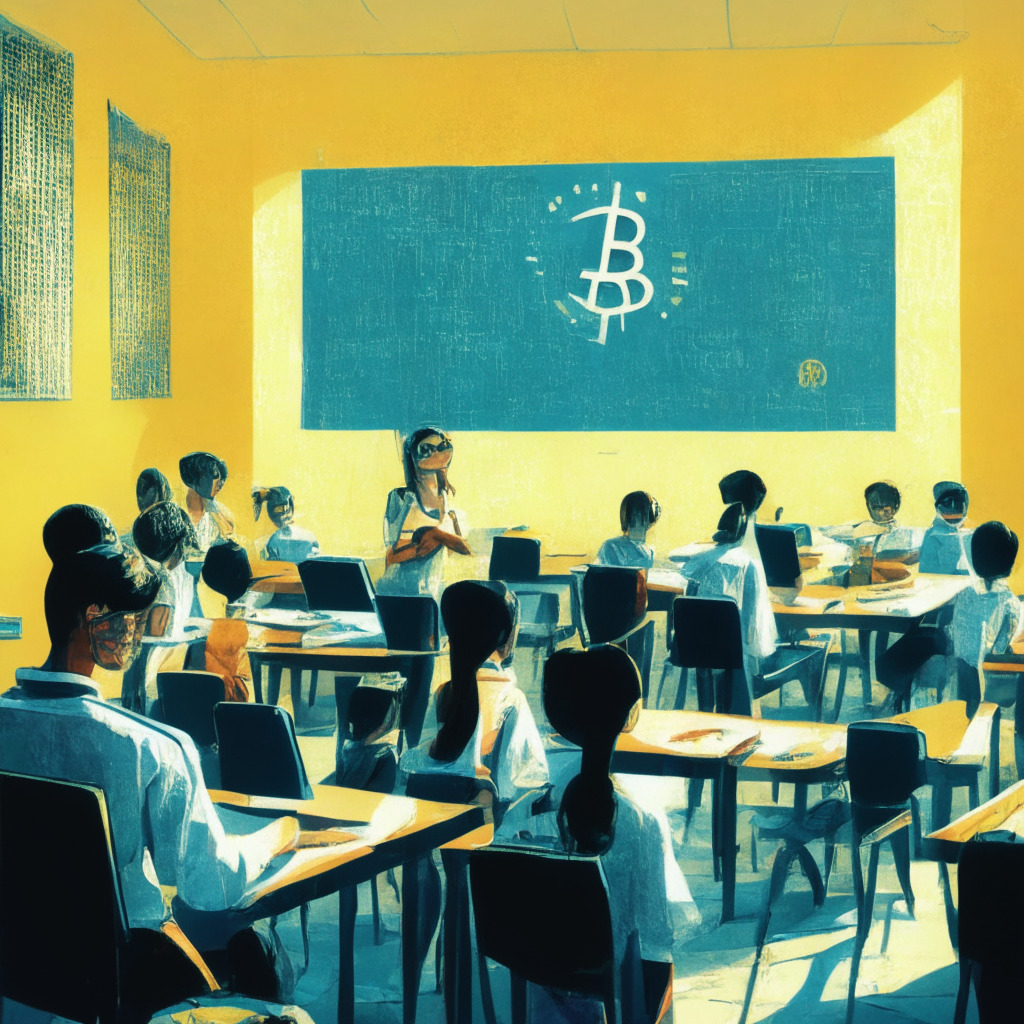The House Financial Services Committee introduced three bills halting the Federal Reserve’s considerations towards a Central Bank Digital Currency (CBDC). Republicans expressed fears over the potential impact on traditional banking and the suspense it could cast on the stablecoin market. Democrats, however, pushed for continued CBDC exploration, reminding of its potential benefits in global economic competition. The Federal Reserve reaffirmed its cautious approach towards CBDC, emphasizing concerns over a stablecoin issuance without federal control.
Search Results for: National Financial System
Government Lens on AI: Lessons from the Crypto Industry’s Regulatory Travels
“John Rizzo suggests the AI sector should anticipate forthcoming scrutiny, much like cryptocurrencies. AI can learn from crypto’s challenges. While crypto tried to integrate into the highly regulated financial sector, AI targets multiple sectors, presenting a larger challenge.”
Swift’s CBDC Connector: Revolutionizing Digital Currency Interaction and Challenging Traditional Norms
Swift, the global financial messaging network, has partnered with three central banks to beta test a cross-border transaction solution for CBDCs. The focus is on interoperability between different digital currencies and current fiat-based systems. Swift’s CBDC innovations are designed to prevent digital islands and establish safe links between existing and future payment systems.
Navigating the Future of Crypto Regulation in India: An Emerging Hope Amid Taxation Concerns
G20 members’ drive for global crypto regulation sparks hope among Indian crypto firms haunted by ambiguity. While the idea of self-regulation has its critics, Japan’s successful implementation bolsters confidence. Despite high taxes from the Indian government, India leads in crypto adoption, with investors increasingly using foreign platforms to avoid heavy tax impositions.
Diving into Russia’s Digital Ruble Debate: Opportunity or Devastating Risk?
“Russia’s active consideration of a Central Bank Digital Currency (CBDC) is encountering challenges including potential rate increases and withdrawal of major backers. Despite concerns, observers remind that cautious innovation is needed as the future of money moves increasingly towards digitization.”
Komainu and Hidden Road Partnership: Elevating Trust in Crypto or Fueling Centralization?
“Institutional investors and partnerships may significantly inspire trust in the crypto industry. The recent alliance between Komainu and Hidden Road engages a secure, regulated custody platform, opening the digital asset marketplace to secure transactions and fostering industry growth and longevity.”
India’s Paradoxical Supremacy in Global Crypto Index: High-Tax-Averse or Accelerator?
“India has topped the Global Crypto Adoption Index 2023, despite strict tax regulations on crypto trades. The tax schemes paradoxically stimulating a shift in transaction methods, thus driving the adoption of digital currencies, particularly in struggling economies like India, Nigeria, and Vietnam.”
Navigating the Future of Finance: Analyzing Project Sela’s Digital Currency Triumphs and Trials
“Israel and Hong Kong have completed their retail central bank digital currency (rCBDC) test runs, focusing on private participation, inclusivity, and security. Project Sela merges cash characteristics with digitization benefits, addressing policy, security, technology, and legal issues. However, real-time gross settlement (RTGS) system limitations and developmental challenges remain.”
Balancing Skepticism and Hope: Insights on the Crypto World from a Central Banker
“Sarah Breeden, the incoming deputy governor of the Bank of England, voices concern over potential financial instability posed by cryptocurrencies. While acknowledging the benefits of blockchain technology, she emphasizes the need for a global regulatory approach to manage cryptos’ volatility and potential economic implications. She sees value in a central bank digital currency as an anchor, while warning against potential privacy issues.”
Transforming Bitcoin into a Global Payment Network: Possibilities and Challenges
Former PayPal President, David Marcus, who is also the CEO of Lightning Network Infrastructure firm, Lightspark, is transforming Bitcoin into a global payment network. He aims to adapt the Lightning Network into a unique protocol for online financial transfers, with the potential to change how currencies such as Dollars, Yen, or Euros move across the globe. However, technical complexities and development challenges exist within the Bitcoin Lightning Network.
Dissecting Project Sela: Orchestrating the Safe Future of Central Bank Digital Currencies
“Project Sela showcases the potential of central bank digital currencies (CBDCs), implementing a novel intermediary approach to reduce liquidity risk. Dealing with concerns about cybersecurity and privacy, it signals a future where transactions settle directly on the central bank’s ledger, inspiring global central banks’ digital transformation.”
Navigating the Digital Wave: Zodia Custody – The Future of Crypto Asset Custody in Singapore
“Zodia Custody, an arm of Standard Chartered, is providing digital asset custody services to financial institutions in Singapore in response to the burgeoning demand for secure crypto solutions. This expansion, spearheading fintech investments, signals crypto’s deepening roots in the financial world.”
Navigating the Seas of Global Crypto Regulation: G20’s Role and India’s Stance Unveiled
“The G20 summit in India recently started a comprehensive global regulation on crypto assets, revealing global recognition of cryptocurrencies’ potential. Despite some disapproval, even India’s Reserve Bank permitted banks to service crypto companies, marking a significant shift towards global acceptance of cryptocurrency.”
Navigating Japan’s Crypto Future: A Tale of Opportunities, Challenges, and Innovation
“Kei Oda, former Goldman Sachs trader and current head of Quantstamp Asia-Pacific, discusses his journey into blockchain and crypto trading. Despite setbacks and high taxation, he recognizes the vibrancy of Japan’s crypto ecosystem, its appeal to startups, and potential for revolutionary uses like Ethereum. Furthermore, Oda expresses confidence in Japan’s balancing act in crypto regulation, inspiring interest even from its largest banking conglomerate.”
Binance’s Uplift Amid Regulatory Scrutiny: Balancing Decentralization and Standardization
“Binance regional markets head Richard Teng insists that despite facing regulatory scrutiny, the exchange remains financially secure and welcomes said scrutiny. Teng expresses support for harmonized standards for the cryptocurrency industry, like the European Union’s Markets in Crypto-Assets (MiCA) regulation. This standardization, however, could challenge the decentralization ethos of blockchain technology.”
El Salvador’s Big Bet: Nation Embraces Bitcoin Education in Schools
El Salvador’s Ministry of Education plans to introduce a comprehensive Bitcoin educational program in 2024, through a collaboration with local NGO My First Bitcoin and the Bitcoin Beach project. This initiative aims to educate 150 public school teachers about the digital currency, expanding the reach of Bitcoin-related learning resources nationally. Critics, however, argue the program’s focus is too narrowly centered on one cryptocurrency.
Crypto Regulation Reforms: India’s Bold Stride for Blockchain Market Accountability
“India, a G20 summit member, is adopting robust regulations for cryptocurrencies instead of an outright ban. The proposed five-point crypto ordinance includes stricter Know Your Customer standards aligned with international anti-money laundering and FATCA regulations, real-time Proof-of-reserve audits, harmonised tax policy, and elevating crypto exchanges to authorised dealers.”
Regulating Crypto and AI: Balancing Technological Innovation with Global Cooperation
“The G20 nations emphasize the need for responsible growth and use of AI, recognizing the potential of crypto assets and digital currencies in fostering a digital world. They propose a global crypto framework to navigate challenges like data protection, potential biases, and human oversight, advocating for a more homogeneous approach in the disjointed global landscape.”
Navigating The Uncertain Future of CBDCs: Global Move and Its Impact on Bitcoin’s Health
“The rise of Central Bank Digital Currencies (CBDCs) demonstrates a global trend towards reliable digital finance. Despite challenges of potential cyber threats and increased financial surveillance, CBDCs promise improved payment efficiency and accessibility. Financial institutions need to educate about digital currencies and strategize integration efforts.”
Casio’s Dive into NFTs: Innovative Approach or Marketing Strategy?
“Blockchain technology has enabled a new form of virtual ownership, NFTs. Notable brands like Casio are utilizing this tech, releasing 3D model G-Shock NFTs as a novel blending of loyalty programs and blockchain. However, whether this represents innovation or a simple marketing ploy remains to be seen.”
Decentralized Finance vs Centralized Finance: Coming Conflict or Synergetic Co-Existence?
“CEO of Binance, Changpeng Zhao, predicts a future where DeFi surpasses CeFi, fueled by his belief in the potential of decentralization. However, the Bank for International Settlements argues that pure DeFi has limited real-world application due to its requirement for centralized oracles.”
Revolutionizing the Freelance World with Cryptocurrencies: A Boon or a Bane?
Using cryptocurrencies for payments in the freelance industry overcomes significant obstacles imposed by traditional banks such as high transaction fees, poor conversion rates and slow processing times. Cryptocurrencies also provide freelancers with more control over their finances, enhanced transaction transparency, and improved account security.
Navigating the Global Ambitions of Coinbase: Expansion, Investments, and Hurdles Ahead
“Coinbase’s ‘Go Broad, Go Deep’ global expansion includes acquiring licenses and enhancing market presence in regulatory clear countries like Europe, Canada, Brazil, Singapore, and Australia. It added six new projects to its Base Ecosystem Fund while cryptocurrency startup LBRY battles a legal charge brought by the SEC.”
Journey Towards a US Central Bank Digital Currency: A Rocky Path or a Road to Progress?
The U.S. is still in the “basic research” phase of developing a central bank digital currency (CBDC), according to Federal Reserve Vice Chairman, Michael Barr. He highlighted the importance of gaining backing from legislative bodies, addressing risks posed by stablecoins, and establishing a competent regulatory framework before proceeding with any initiatives.
Coinbase Expansion: Pursuing Global Reach Amid Regulatory Ambiguity
“Cryptocurrency exchange Coinbase is eyeing international expansion, with focus on UK, EU, Canada, Brazil, Singapore, and Australia. Despite initial doubts, the company is strategically positioning itself as a trusted brand in Europe ahead of crucial 2024 elections and plans to introduce derivatives to new markets.”
IMF and FSB’s Joint Synthesis Paper Revealed: New Approach to Crypto Regulations for G20 Summit
The joint synthesis paper from the International Monetary Fund and the Financial Stability Board discusses the challenges of implementing a total ban on crypto activities. Instead, it recommends targeted limitations and emphasizes the need for robust regulatory scrutiny. The paper also advises caution against granting crypto legal tender status, calls attention to potential risks associated with stablecoins and DeFi, and highlights possible macro-financial risks in emerging markets.
China’s Crypto Clampdown vs Global Leanings: Divergent Paths in Blockchain Evolution
China continues its crackdown on crypto activities on Weibo, targeting more than 80 influential crypto personalities. Meanwhile, the IMF and FSB released policy recommendations to manage cryptocurrency-associated financial risks. In other developments, the DFINITY Foundation partners with Lugano’s municipality and Unstoppable Domains added .eth domain support to its messaging service.
Decentralized Finance: A Regulatory Riddle for Global Institutions
The International Organization of Securities Commissions (IOSCO) urges regulators to understand the real power holders in DeFi despite the system’s decentralized façade. IOSCO suggests these ‘responsible persons’ should comply with investor protection and market integrity standard. Current regulations may prove ineffective due to DeFi’s unique operation models, hence requiring new regulatory approaches.
Navigating the Waters of Crypto Regulation: IMF & FSB Unveil Joint Policy Paper
“The IMF and FSB published a joint policy paper regarding the future of crypto regulation, focusing on stablecoins and decentralized finance (DeFi). While it offers guidance, it establishes no new policies, emphasizing the need for an effective balance between paper recommendations and practical application.”
Balancing Act: Prohibit or Permit Crypto? Understanding G20’s Call for Nuanced Regulation
The G20-supported report emphasizes enhancing monetary policies, securing against fluctuating capital flow and clear crypto taxation to counter macroeconomic stress. It indicates broad-spectrum crypto prohibitions might not effectively mitigate potential vulnerabilities. The report also discusses potential risks inherent in stablecoins. Well-designed regulatory measures are advocated as key defenses against crypto disruptions.
Expanding Horizons: SBI Remit and Ripple’s Blockchain Impact on Southeast Asian Remittances
“SBI Remit partners with SBI Ripple Asia to implement Ripple’s XRP-enabled international remittance solution, extending services to bank accounts in Vietnam, Indonesia, and the Philippines. Utilising XRP as a “bridge currency”, this move aims to streamline international payments, ensuring efficient and cost-effective money transfers.”
The Ripple Effect: SBI Group’s Leap into Blockchain Remittance – Pros, Cons, and Conflicts
“Japanese SBI Group, in partnership with Ripple and SBI Ripple Asia, plans to extend Ripple remittance technology to South East Asia’s banks. SBI hopes this will boost service adoption, marking a significant milestone in the crypto space.”































